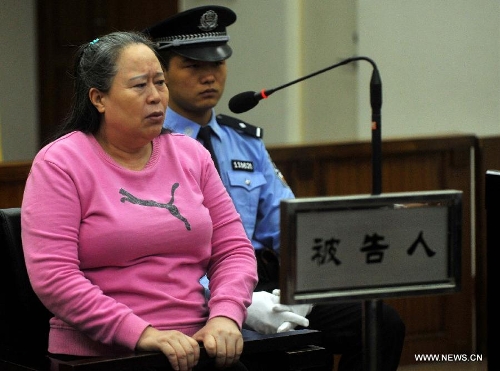Woman who led minister's fall pleads guilty to bribery

Ding Yuxin, once called Ding Shumiao, a bussinesswoman who was involved in the corruption case of former railway minister Liu Zhijun, is on trial at the No. 2 Beijing Municipal Intermediate People's Court in Beijing, capital of China, Sept. 24, 2013. Ding had intervened in bidding for relevant railway projects through staff of the railway ministry and was engaged in illegal business operation involving more than 180 billion yuan(29.4 billion U.S.dollars), according to a previous statement from the procuratorate. (Xinhua/Gong Lei)
A well-known female millionaire who had ties to disgraced former railways minister Liu Zhijun pleaded guilty on Tuesday in Beijing to charges of bribery and illegal business activities.
Ding Yuxin, formerly known as Ding Shumiao, admitted that she had given the former railways minister a total of 49 million yuan ($8 million) to help him secure higher level government posts as well as help exonerate one of his subordinates, according to statements from the Beijing Second Intermediate People's Court.
Ding told the prosecutors that Liu had helped her amass a great deal of wealth and in return, she would do anything Liu demanded without a second thought on how much money it required.
Ding also admitted that she had given more than 40 million yuan to Fan Zengyu, a director from the Poverty Alleviation and Development Office of the State Council. Ding said she provided the funds to Fan upon his request. In exchange, Fan granted Ding charity awards and helped polish her company's public image in an effort to avoid inspections from authorities.
According to the court statement, Ding had helped 23 companies secure 57 railway construction contracts worth over 185.8 billion yuan. Ding and her accomplices had profited to the tune of over 3 billion yuan from kickbacks.
Despite previous accusations, Ding denied that she offered sexual favors to Liu by arranging an unspecified number of women for him, adding that as a woman she would never do such a thing.
Throughout Tuesday's trial, an ambulance had been waiting outside the court due to Ding's poor health condition. She was seen wearing a hat during the court hearing to protect her wounds after two craniotomy surgeries.
Liu originally assisted Ding in "finding a way" to help get one of his subordinates off the corruption charges. Ding and her accomplice paid a middleman over 30 million yuan only to find later that the middleman was a con artist.
Ding, 58, had little education and a humble beginning as an egg vendor, but over three decades built a business empire with interests in coal as well as China's high-speed rail system.
"Ding is a good example of how businesses are deeply intertwined with politics in China. Ding's success came from her close ties with the former railways minister and was destroyed by the very man who brought her immense wealth. What we saw here is a pattern in which businesspeople work in partnership with officials where through exchange of money and power they mutually benefit from the collaboration but pose a greater threat to the system," Lin Zhe, an anti-corruption expert at the Party School of the CPC Central Committee, told the Global Times.
Officials launched an inquiry into Ding when an auditing authority found a State-owned enterprise paid nearly 100 million yuan to her company.
Liu, her patron, was sentenced to death with a two-year reprieve after a high-profile trial this summer. He was convicted of taking bribes totaling 64.6 million yuan.
Other railways ministry officials have also been charged with corruption and abuse of power. Zhang Shuguang, former head of the Railways Ministry's transportation bureau and deputy chief engineer, was charged on September 10 with accepting more than 47 million yuan in bribes. Zhang pleaded guilty to the charges.
"Ding's success followed a pattern that was not regulated by the law but by unspoken rules where some officials use money to climb up the career ladder and trade their power for more wealth. We need to break this cycle and the way to do it is to strictly implement the law," noted Lin.